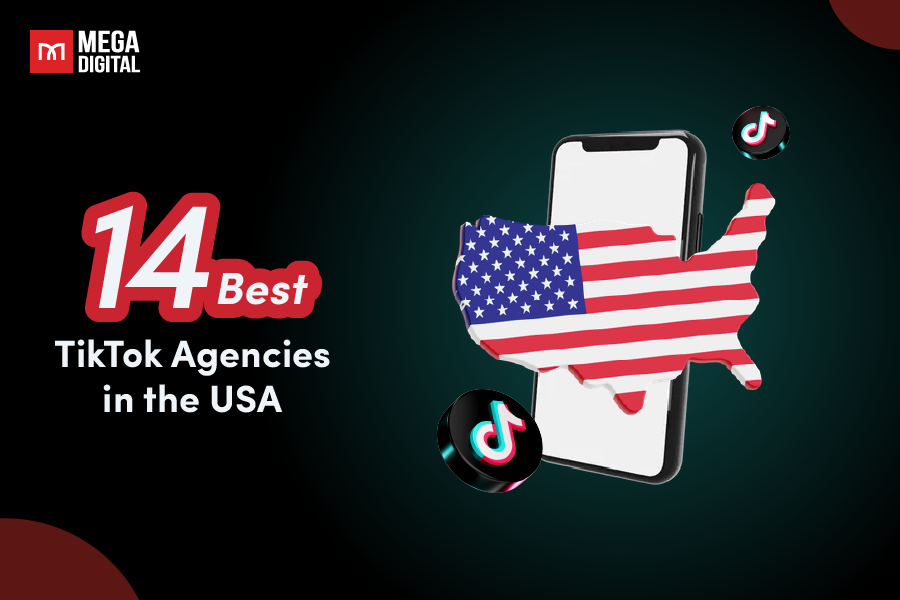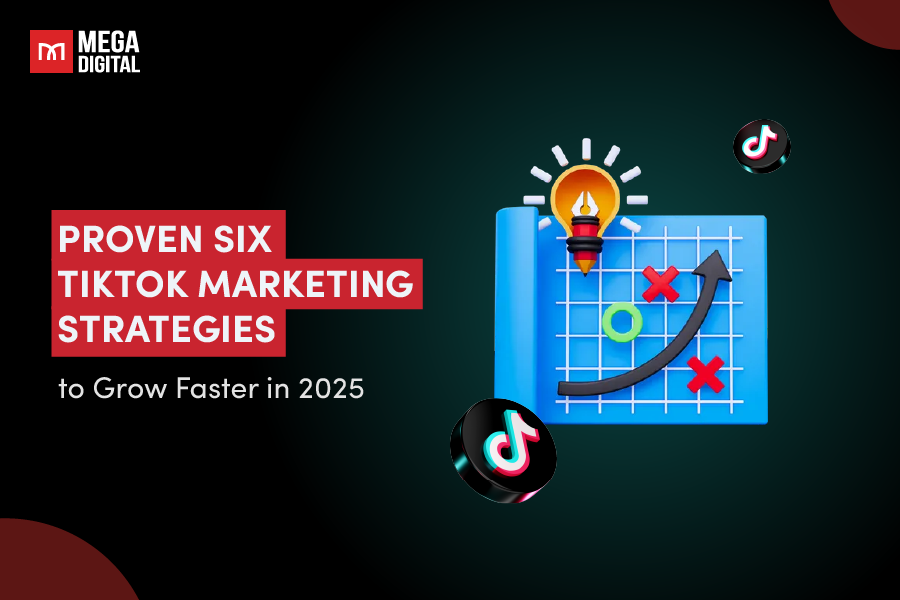Are you a lawyer aiming to grow your client base? Using PPC for lawyers can put your firm in front of potential clients quickly and strategically. By using targeted, flexible, and locally focused ad campaigns, you can connect with people seeking legal help, ensuring your services are highly visible. Let’s dive right in!
Why PPC Matters for Lawyers
PPC advertising is a valuable tool for law firms, helping them attract clients quickly and efficiently. Here’s how PPC makes an impact.
Quick Results and Enhanced Visibility
PPC ads allow law firms to instantly appear at the top of search results, which is crucial for practices that need immediate visibility, such as personal injury or criminal defense.

Unlike slower, organic strategies, PPC provides fast access to potential clients who are actively searching for legal assistance, increasing the chance to connect with them when it matters most.
Targeted Audience Reach
With PPC, law firms can focus on specific keywords and reach only those searching for related legal services, which helps avoid wasted spending by connecting firms directly with potential clients.
For instance, a divorce attorney can target a “divorce lawyer near me,” while a criminal lawyer might focus on a “DUI defense attorney” to reach their clients.
Flexibility and Scalability
PPC campaigns also offer flexibility in both budget and reach. Law firms can adjust campaigns as needed, whether increasing the budget during peak seasons or refining keywords to improve performance.
This adaptability allows firms to optimize ad spend based on real-time results, making PPC a sustainable and effective marketing strategy.
5 Best PPC Ad Formats for Law Firms
When it comes to PPC advertising for law firms, choosing the right ad format can make all the difference. Here are five ad formats that I found most effective for you should consider, along with the best platforms to use them on.
#1 Search Ads (Google Ads)
Search ads are highly effective for law firms, as they reach potential clients who are actively searching for legal services.
On Google Ads, these ads appear at the top of search results when users enter specific keywords like “divorce lawyer in Dallas” or “personal injury attorney near me.” This positioning means you’re reaching people with high intent – those ready to connect with a lawyer and likely to convert.
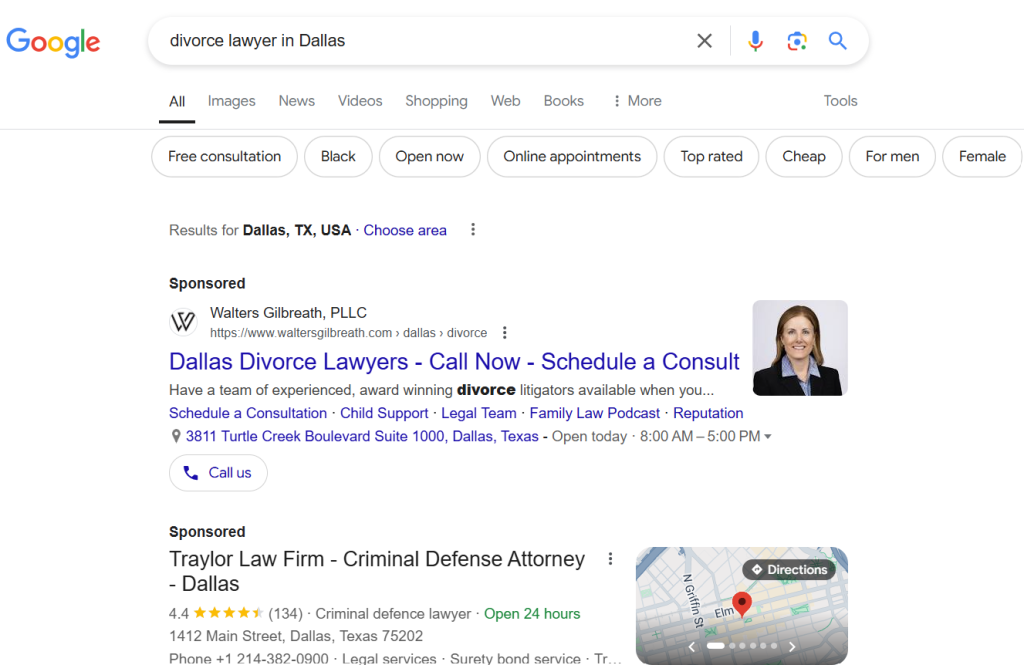
To make the most of Search Ads, focus on crafting ad copy that matches the user’s search intent and highlights your firm’s unique offerings.
For instance, if you’re targeting personal injury clients, an effective ad might read, “Dallas Personal Injury Lawyers | Free Consultation, Pay Only If We Win.” Include specific calls-to-action like “Call Now” or “Book a Consultation,” as these prompt immediate responses.
Additionally, consider using call extensions and site links to direct users to relevant landing pages, such as dedicated service pages for “Auto Accidents” or “Medical Malpractice” to increase the chances of turning clicks into consultations.
>>> Read more: We Tried Google Ads for Lawyers: Here’s How We Succeeded
#2 Local Service Ads (Google Ads)
Unlike traditional ads, Local Service Ads (LSAs) Google displays key information about your firm upfront, including your name, ratings, phone number, and office hours. This allows potential clients to call, message, or book an appointment directly from the ad without having to visit your website.
Therefore, LSAs are particularly effective for areas like personal injury, family law, or criminal defense, where clients often want a nearby attorney they can easily reach.
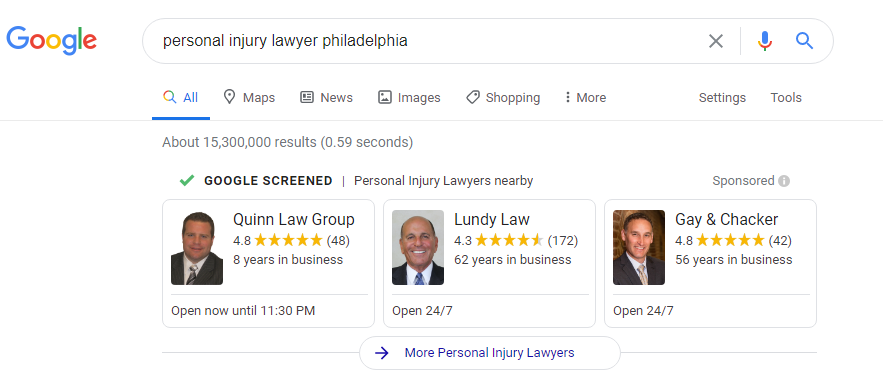
Imagine a family law firm in Austin that handles cases such as divorce and child custody. This firm can set up LSAs to target individuals within a 15-mile radius, ensuring their ads reach people who are actively searching for family law assistance nearby.
Through LSAs, this firm could highlight high ratings and include specific information like “30+ Years of Experience in Austin” to build trust immediately. The ad’s Google Screened badge would signal that the firm meets Google’s standards, adding credibility for potential clients.
Additionally, the cost structure of LSAs is another advantage: you only pay for actual leads, not clicks, which helps ensure a better return on your advertising spend.
#3 Retargeting Ads (Google Display Network, Facebook Ads)
By using platforms like the Google Display Network and Facebook Ads, you can keep your firm top-of-mind for users who visited your website, perhaps even specific pages, yet left without contacting you.
Retargeting allows you to create multiple ad variations based on user interactions, such as divorce, personal injury, or estate planning.
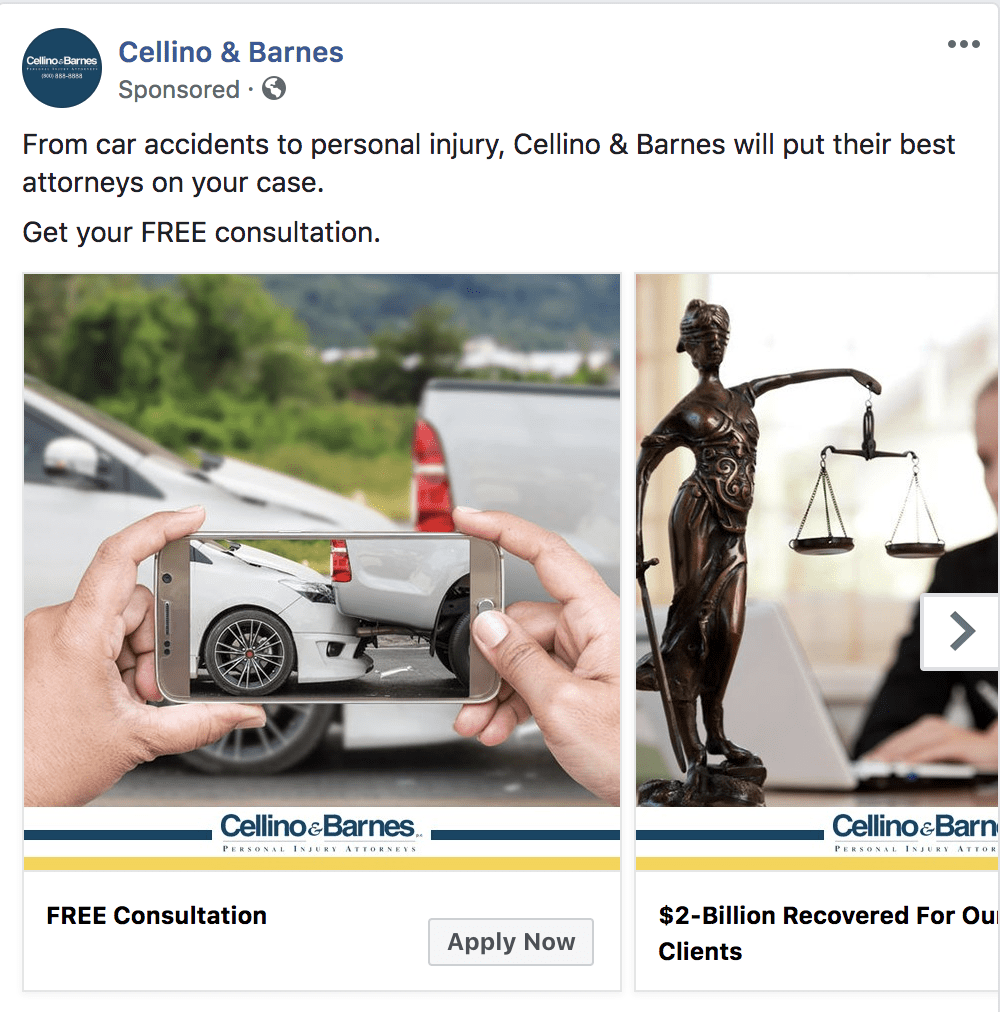
For instance, say someone visited your family law page, exploring information on child custody cases but left before booking a consultation. Through retargeting, you can display a tailored ad that speaks directly to their needs, such as, “Experienced Custody Lawyers in New York – Get Support Today” to remind them of your expertise and availability, meeting them exactly where they left off.
#4 Video Ads (YouTube)
Video Ads on YouTube are an engaging way for law firms to connect with potential clients on a more personal level. Since YouTube is the second-largest search engine, placing ads here lets you reach a broad audience while giving them a glimpse of your firm’s expertise and personality.
Having short videos (15-30 seconds) that explain your firm’s services or highlight client testimonials can also effectively build trust and awareness. Your video ad could introduce a personal injury attorney, briefly explain your services, and encourage viewers to call for a free consultation.

Take, for example, Morgan & Morgan, a well-known personal injury law firm. They run short video ads where attorneys introduce the firm’s mission, highlight specific services, and end with an invitation like, “Contact us for a free consultation.” In just 20 seconds, one ad showcases real clients sharing their positive experiences, which builds trust and shows viewers they’re in good hands.
These video ads work well because they’re targeted to users who are actively searching for help, like “car accident lawyer” or “injury attorney,” making them more likely to connect with viewers’ needs.
#5 Social Media PPC Ads (Facebook, Instagram, and Twitter)
Social media platforms like Facebook, Instagram, and LinkedIn offer law firms unique opportunities to connect with potential clients through targeted Social Media PPC Ads.
Each platform allows for precise targeting based on location, interests, and behaviors, which is especially effective for promoting specific services such as estate planning, divorce, or criminal defense.
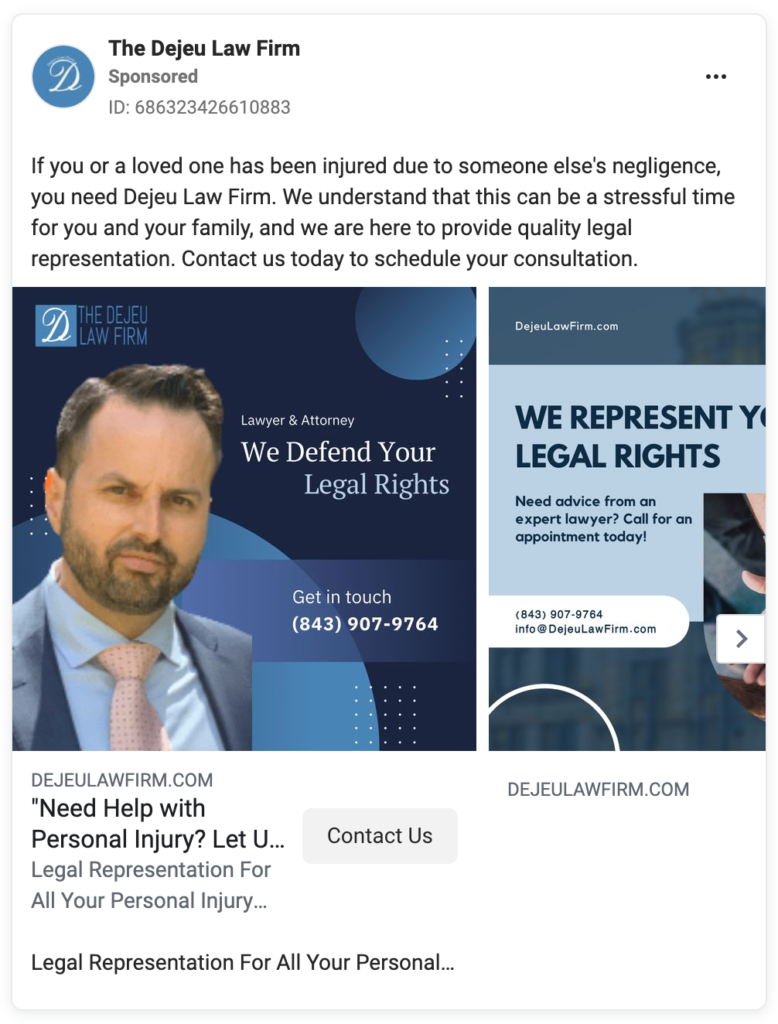
For instance, a family law firm could run a Facebook carousel ad that highlights different areas of family law, such as child custody, divorce, and mediation, each with a short client testimonial. The ad might feature images of satisfied clients (with permission) alongside a call-to-action like, “Get in Touch Today for Compassionate Guidance” to help potential clients quickly see multiple services and gain insight into the firm’s approach.

Twitter, meanwhile, is ideal for quickly reaching audiences interested in timely topics or trending legal issues
For example, a criminal defense law firm could run a promoted tweet targeting users who follow local news outlets, law-focused accounts, or hashtags like #CriminalLaw or #LegalAdvice.
The ad could also feature the headline “Know Your Rights: Recent Updates in Criminal Law” and a link to a blog post detailing these updates and relevant case studies to encourage viewers to click for insights and consider the firm for immediate consultation.
Effective PPC Strategies for Law Firms
To make the most of PPC advertising, law firms need a clear strategy that focuses on reaching the right clients and driving meaningful results. In this part, I will give you a breakdown of key tactics to ensure your PPC campaigns are successful.
Identifying Relevant Keywords
The foundation of any strong PPC campaign is the right keywords. You can begin by researching terms that prospective clients might use, such as “personal injury attorney” or “estate planning lawyer near me.”
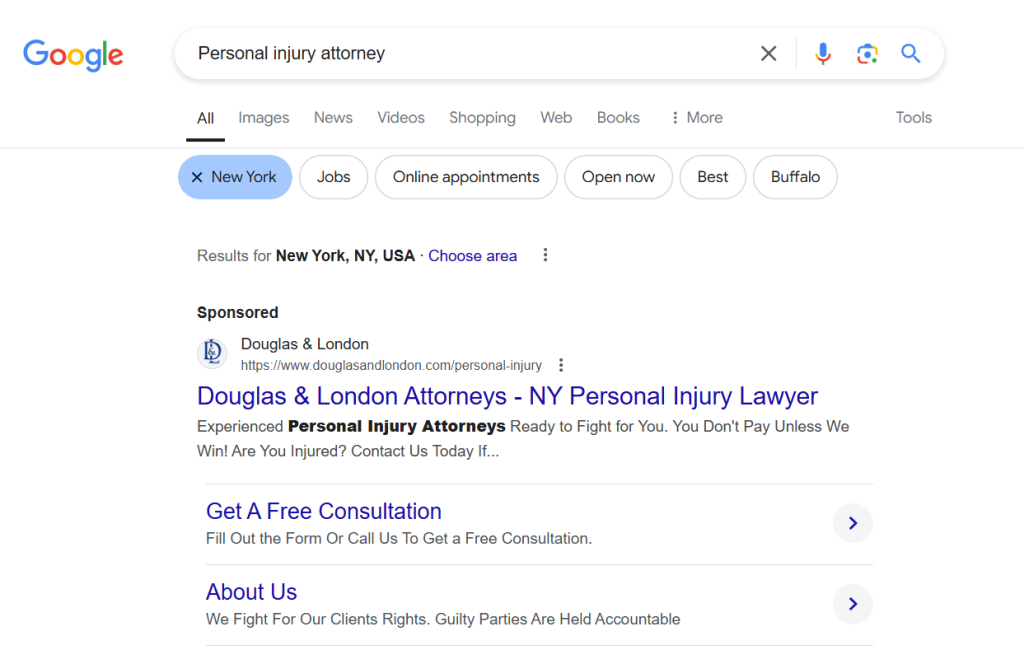
Besides, you need to consider specific phrases that reflect the unique services your firm offers, focusing on high-intent keywords to attract clients ready to take action.
I highly recommend you use tools like Google Keyword Planner to identify keywords with strong search volumes, but it’s essential to balance broad terms with more specific, long-tail keywords to capture both general and niche searches.
Crafting Goals and KPIs for Campaigns
Once your keywords are set, it’s time to define goals and metrics to measure success. You need to think about what outcomes matter most: are you aiming to increase consultation requests, get more calls, or drive website visits?
Then, you can set clear KPIs (Key Performance Indicators), such as a target number of leads or a maximum cost-per-acquisition (CPA), to keep your campaign on track. These goals will give purpose to your efforts, and KPIs help you assess and refine those efforts, ensuring each ad dollar goes toward generating potential clients.
Creating Compelling Ad Copy
Next, focus on writing ad copy that’s both informative and persuasive. This is your chance to stand out by showcasing your firm’s strengths, like experience, personalized service, or case success rates.
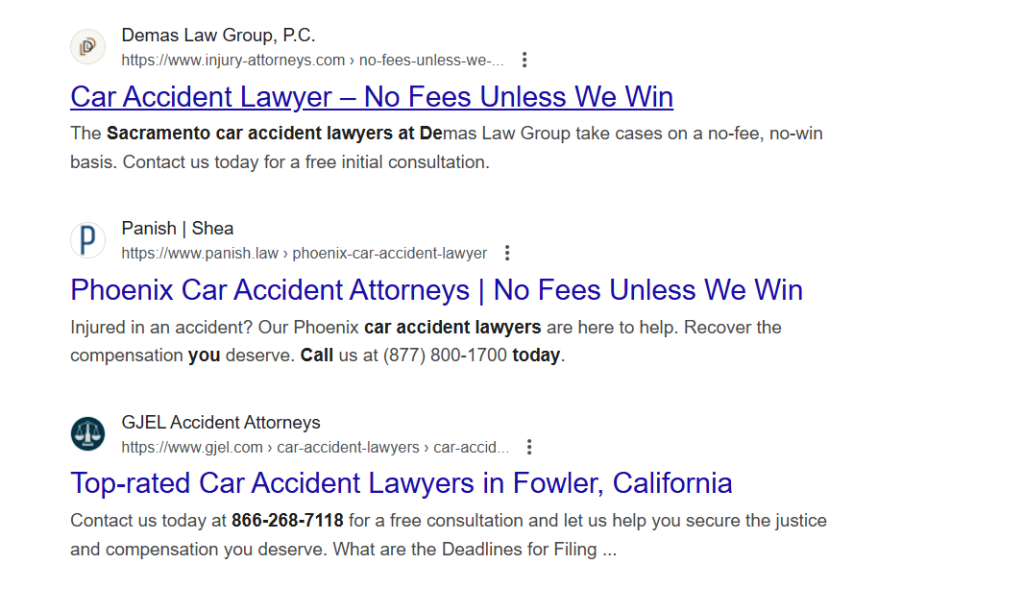
For example, if your firm handles personal injury cases, crafting Google ad copy that is both informative and persuasive is key to standing out from the competition, such as: “Top-Rated Car Accident Lawyers – Free Consultation, No Fees Unless You Win. Call Today!”
This ad highlights several persuasive elements: credibility (“Top-Rated”), accessibility (“Free Consultation”), and a client-centered payment structure (“No Fees Unless You Win”).
Then, you can include a call-to-action, like “Call Today” or “Book Your Free Consultation Now,” which encourages immediate engagement.
Local Targeting
Local targeting is essential for law firms, as clients often seek attorneys close to home. With PPC platforms like Google Ads, you can use powerful geo-targeting tools to ensure your ads reach only those in your immediate area, focusing your budget on local leads.
For example, Google Ads allows you to set up location targeting by specifying exact cities, zip codes, or even a custom radius around your office.
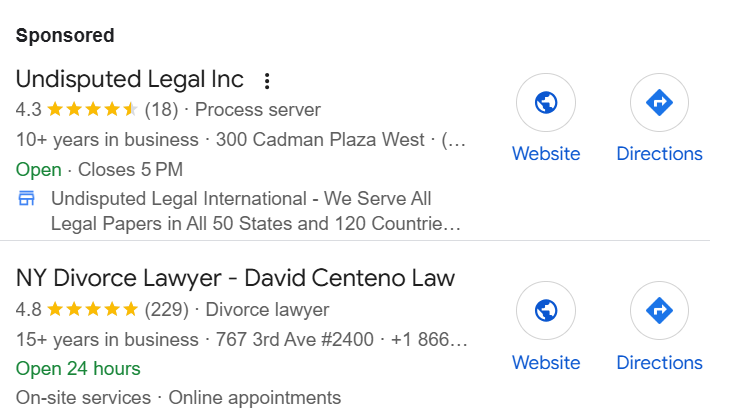
If your firm serves the Dallas area, you can narrow targeting to Dallas itself, or expand to surrounding cities like Fort Worth and Arlington by setting a 25-mile radius, so, only people searching within that area see your ads.
Additionally, Google’s Location Extensions can further enhance local targeting by displaying your firm’s address, directions, and a clickable phone number directly in the ad. Using Google My Business integration alongside Location Extensions, you can make sure your firm appears prominently in searches like “divorce lawyer near me” or “criminal defense attorney Dallas.”
Using Ad Extensions for Law Firms
By displaying a call button directly in the ad, you may enable mobile users to reach your office with a single tap, making it easy for potential clients to connect instantly when they’re searching for immediate legal help. This feature is particularly useful in urgent cases, like personal injury or criminal defense, where clients are more likely to contact the first responsive law firm they find.
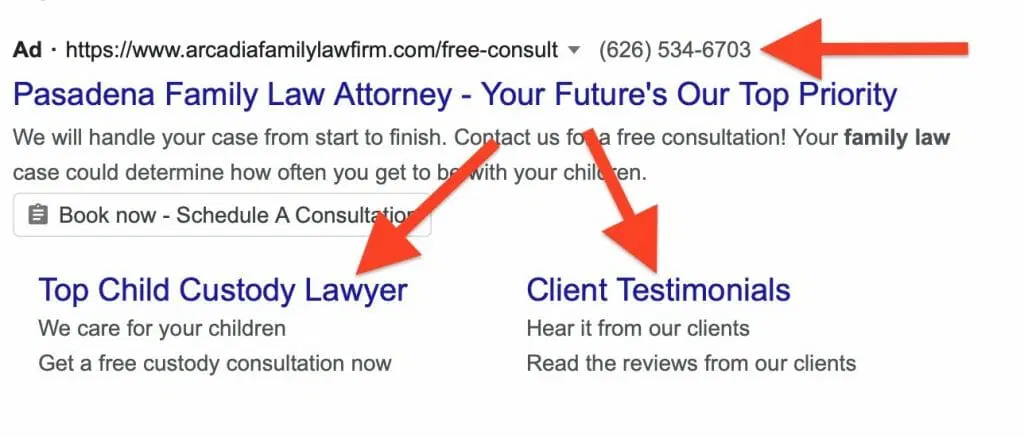
Additionally, location extensions are a great way to build trust with nearby clients. If you want to reassure users that your office is nearby, making it a convenient option, consider displaying your firm’s address and a direct link to Google Maps in your ad.
For firms offering multiple services, site link extensions allow you to link directly to specific practice areas, such as “Divorce Law,” “Estate Planning,” or “Workers’ Compensation.” This setup lets users find exactly what they need faster and increases the chances they’ll contact you.
Retargeting Strategies
Not every potential client will reach out on their first visit, and that’s where retargeting becomes crucial. Retargeting ads allow you to stay top-of-mind by reaching users who have already visited your website but didn’t take action – like scheduling a consultation or calling your office.
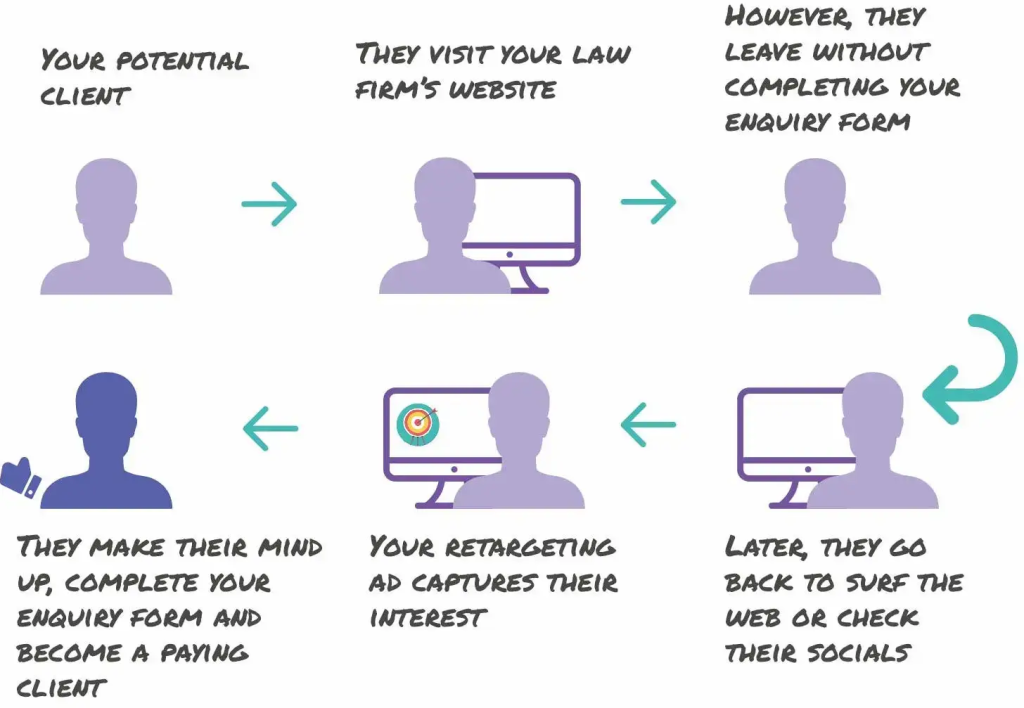
For example, let’s say a visitor browsed your family law services page but left without booking an appointment. With retargeting, you can serve that same visitor a follow-up ad showcasing your expertise in family law, such as, “Need Help with Child Custody? Call for a Free Consultation” and increase the chances they’ll return to your site and take action this time.
This strategy works well because it targets people who have already expressed interest in your services. Since they’re already familiar with your firm, they’re more likely to convert when they see your retargeting ads.
Monitoring Performance Metrics
Metrics like click-through rate (CTR), conversion rate, and cost-per-click (CPC) provide a clear picture of how your ads are performing.
For example, if you notice a high CTR but low conversions, this could indicate that your ad copy is compelling but your landing page isn’t converting visitors into leads. In this case, you might want to A/B test your landing pages to see what content or design elements drive more action, such as a stronger call-to-action or simplified forms.
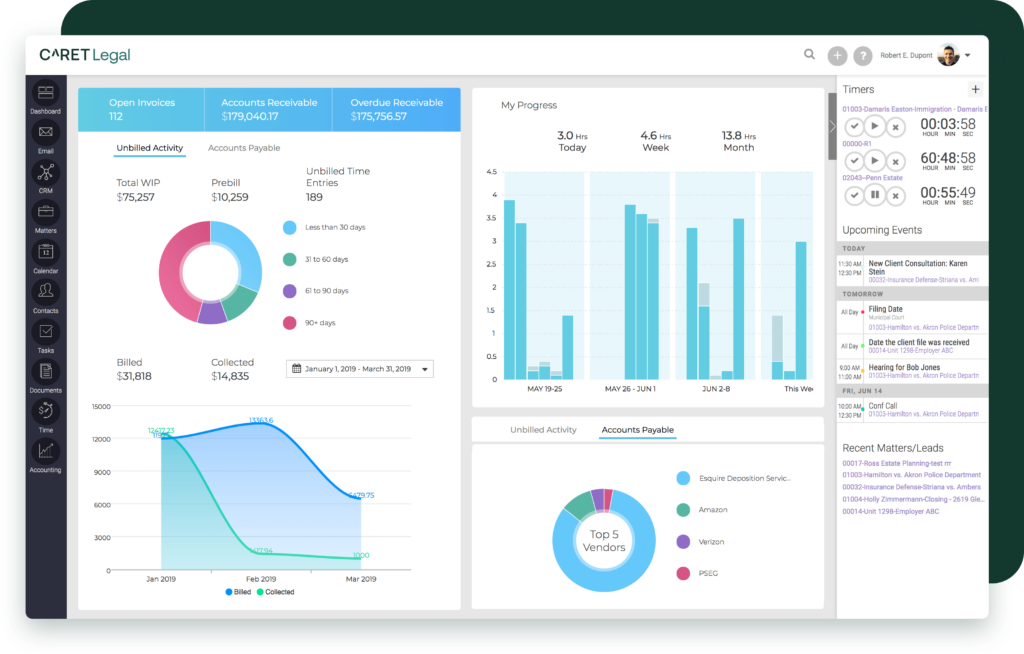
If you’re seeing a high CPC, it could mean your keywords are too competitive or too broad, driving up costs. In this case, refining your keyword selection such as targeting more specific long-tail keywords or adding negative keywords to filter irrelevant traffic to help lower your costs while improving the quality of your leads.
Cost to Run PPC for Law Firms
Running PPC campaigns for law firms requires careful budget planning, as costs can vary significantly based on location, competition, and practice area. Let’s break down the key cost factors to help you maximize your budget effectively.
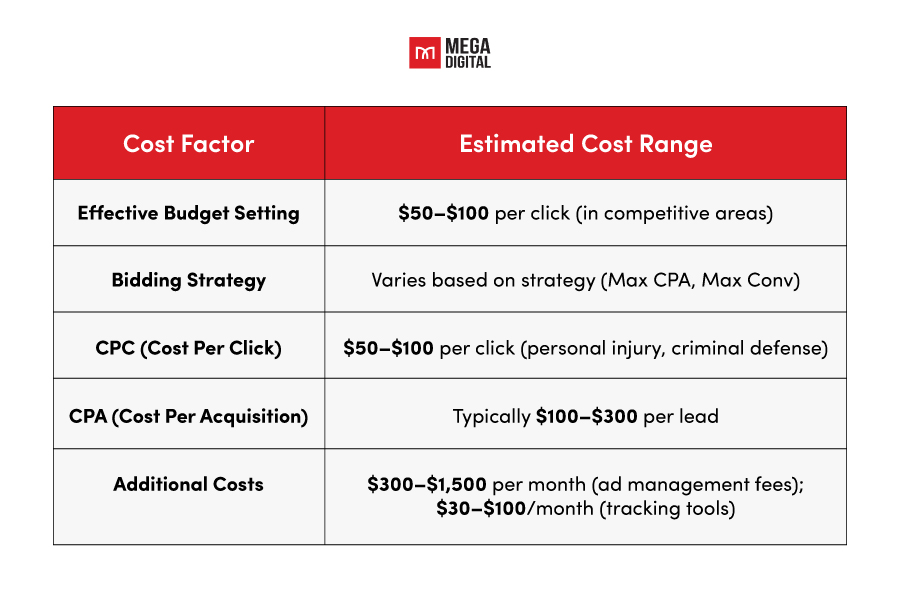
On average, you can expect to pay anywhere from $50–$100 per click in high-demand areas like personal injury or criminal defense. With additional costs for management fees and tracking tools, a law firm’s monthly PPC budget can range from a few hundred to several thousand dollars.
Budgeting Tips for Law Firm PPC Campaigns
Now let’s go over some essential strategies to ensure your budget is allocated wisely and maximizes your return on investment.
Setting an Effective Budget
To set an effective budget, begin with a realistic budget that aligns with both your practice’s goals and typical costs in your area of law.
For instance, personal injury and criminal defense practices tend to have higher PPC costs than smaller niche areas, so budgets should reflect the competitive landscape. Many law firms start by allocating around $2,000–$10,000 monthly, depending on factors like practice type and geographic scope. Here’s how to set an effective budget:
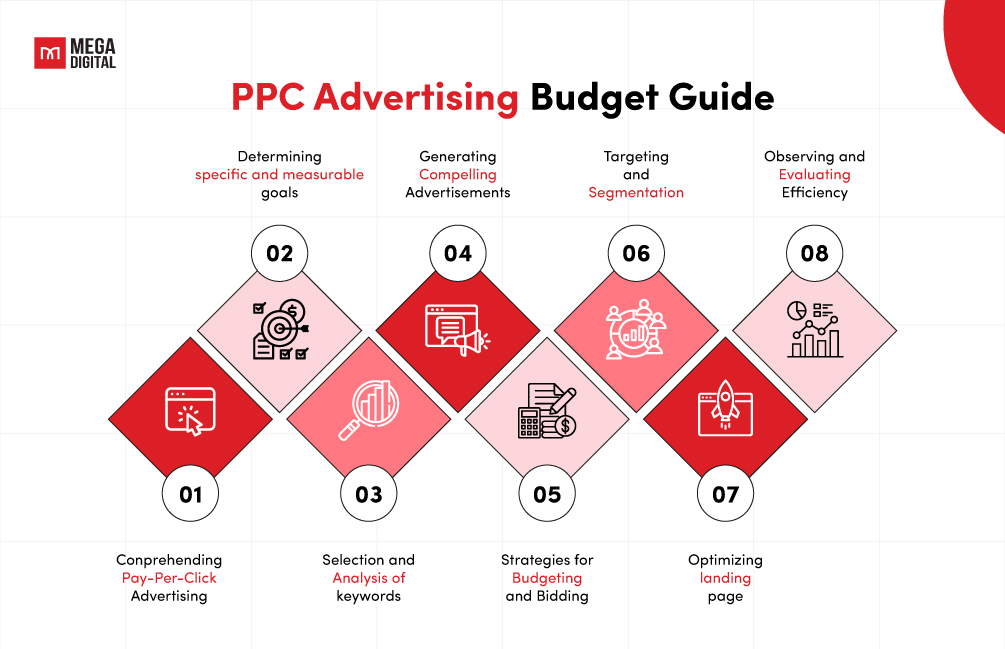
- Estimate Your Cost-Per-Lead: To do this, determine how much each new client is worth to your firm. If a client’s case typically brings in $5,000, you might allocate around 10-20% of that revenue per lead acquisition. This approach helps set a foundation for reasonable costs.
- Adjust Based on Results: Start with a pilot budget to test the waters. After a month or two, analyze your results, and be prepared to adjust spending—either ramping up where returns are strong or shifting focus if certain keywords or campaigns don’t perform as expected.
Bidding Strategy Tips
Choosing the right bidding strategy is key to managing costs and achieving your campaign goals. Google Ads and other platforms offer several strategies, like Maximize Conversions, Target CPA, and Manual CPC. Here’s a quick guide to help you decide:
- Maximize Conversions: Ideal if your main goal is lead generation. This strategy uses your budget to get as many conversions as possible.
- Target CPA: Good for controlling your budget when you have a set cost in mind per client. This strategy bids automatically to hit your target CPA.
- Manual CPC: Offers greater control over individual keyword bids, making it useful if you have a few high-priority keywords that drive the most leads.
Monitoring Cost-Per-Click and Cost-Per-Acquisition
Once your campaign is live, regular monitoring of Cost-Per-Click (CPC) and Cost-Per-Acquisition (CPA) is essential to stay within budget and make data-driven adjustments.
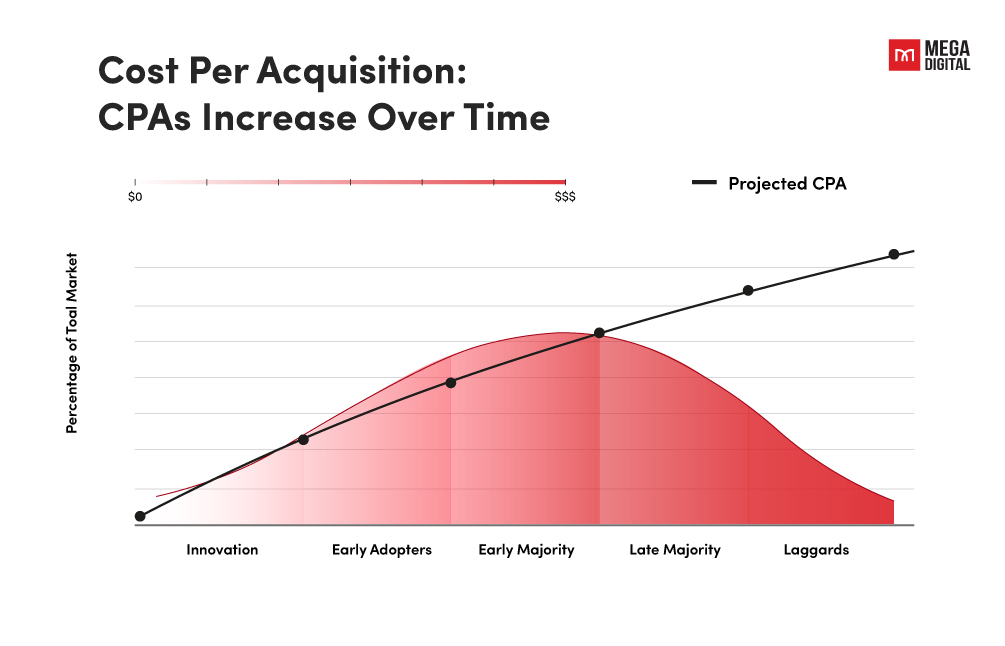
- CPC: Keep a close eye on CPC for your keywords, especially for high-cost terms like “personal injury lawyer” or “divorce attorney.” If CPC rises too high without sufficient returns, consider adjusting keyword bids or focusing on less competitive, long-tail keywords.
- CPA: CPA tells you how much each conversion is costing your firm. If CPA is above your target, review your ad copy, targeting, and landing pages to see where improvements can be made. By lowering CPA, you make sure each dollar you invest brings in the most value possible.
Common PPC Pitfalls for Lawyers and How to Avoid Them
Even with a strong PPC strategy, common mistakes can drain your budget and limit your results. To make every dollar count, let’s explore three pitfalls law firms often face in PPC and how to avoid them for a smoother, more profitable campaign.
Ignoring Keyword Research
Not diving deep into keyword research can lead to wasted ad spending on broad, unfocused terms. If your firm specializes in personal injury cases, for instance, generic keywords like “legal help” might attract irrelevant clicks. Instead, focus on precise terms like “car accident lawyer near me” or “injury attorney free consultation.”
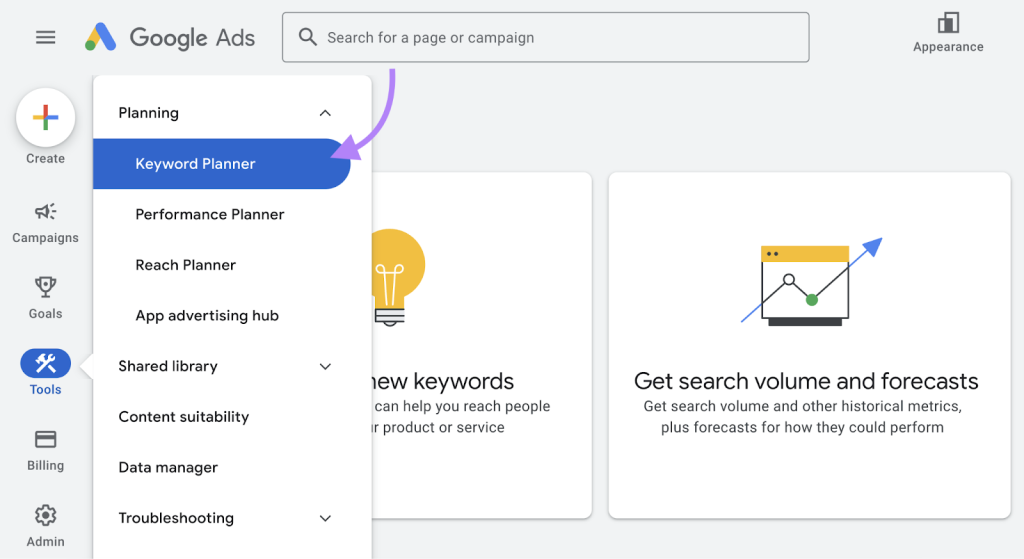
Solution: Use tools like Google Keyword Planner or SEMrush to find keywords directly tied to your practice areas, and check these regularly to stay aligned with current search trends to keep your ads highly relevant to the people who need your specific services.
Using Irrelevant Ad Copy
Generic ad copy is easy to overlook in a sea of search results. Your ad needs to immediately address the potential client’s needs and make your value clear. If someone searches “family law attorney Miami,” your ad should feature that phrase and offer something meaningful, like “Experienced Miami Family Lawyer – Free Initial Consultation.”
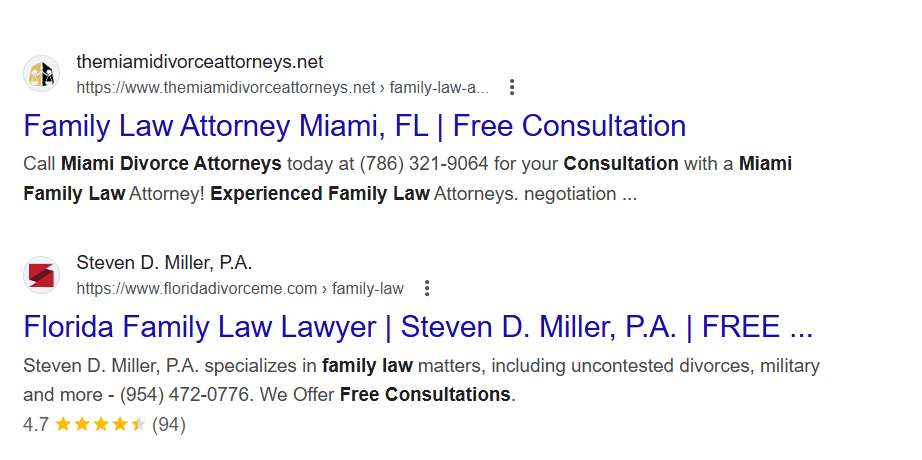
Solution: Tailor your ad copy to each keyword, highlighting specific services, locations, and perks such as free consultations or specialized experience. Regularly test different ad versions to find out which approach brings in the most leads.
Overlooking Negative Keywords
Without negative keywords, your ads may appear in irrelevant searches, draining your budget quickly. For example, if you’re a criminal defense firm that doesn’t handle DUI cases, adding “DUI” as a negative keyword will prevent clicks from people seeking DUI defense.
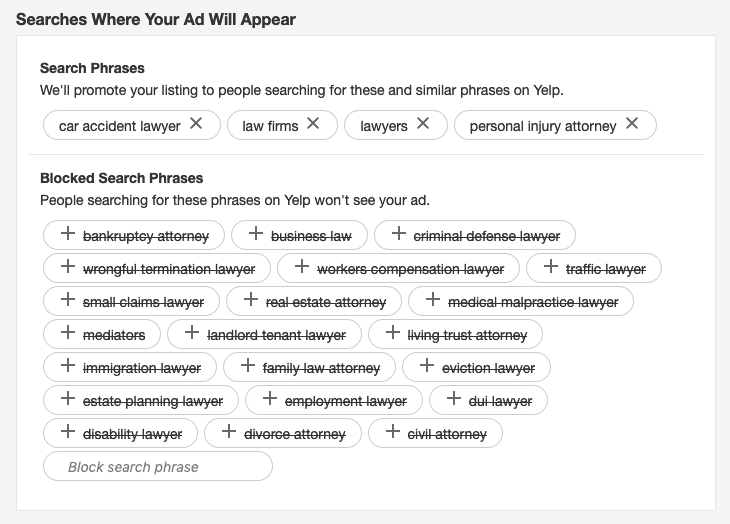
Solution:
To avoid this, create a list of negative keywords that filter out searches irrelevant to your practice. Regularly review and update this list to refine your targeting. Here are some negative keyword suggestions to get you started:
- “DUI, immigration, consultation, personal injury, etc” – If your firm doesn’t handle such cases, exclude terms like “DUI lawyer”, “personal injury lawyer”, and “immigration attorney”, to avoid irrelevant clicks.
- “Free” – Exclude keywords like “free lawyer” or “free consultation” if you don’t offer free services.
- “Pro bono” – Remove terms like “pro bono lawyer” if you don’t offer pro bono work.
- “Cheap” or “low-cost” – Exclude terms like “cheap lawyer” unless you specifically market affordable services.
- “Lawyer jobs” – Exclude job-related terms like “lawyer jobs” to avoid targeting job seekers.
- “Online legal advice” – Remove “online legal advice” if you don’t offer virtual consultations.
- “Consultation” – If you charge for consultations, exclude terms like “free consultation” to avoid attracting people who expect no charge for an initial meeting.
Wrap Up
I hope these insights have given you a solid foundation to start or refine your law firm’s PPC strategy. By applying the right PPC for lawyers strategies and tips here, you’re well on your way to maximizing your reach and generating meaningful client connections. Happy advertising!







